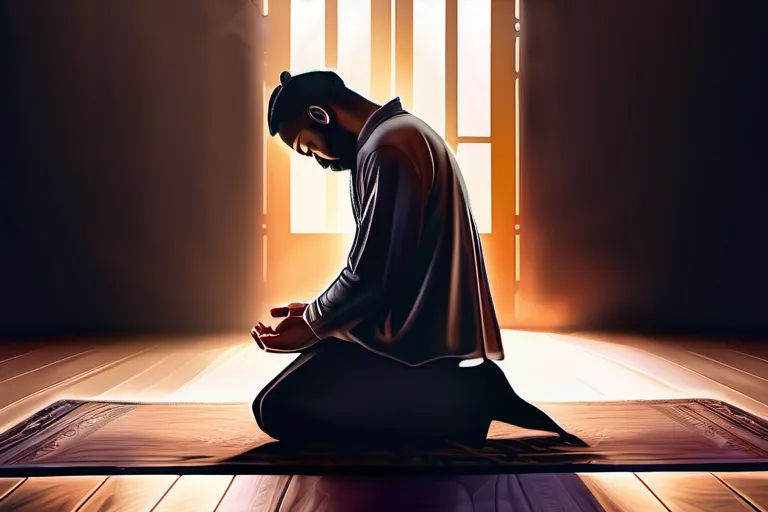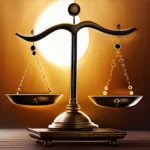Explore the religious teachings and practices that can help you find peace and forgiveness when dealing with guilt.
Guilt is a powerful emotion that can have a profound impact on our lives. When this feeling arises from religious transgressions, it can be especially difficult to overcome. This article provides a detailed guide to understanding and dealing with guilt from a religious perspective.
Understanding Religious Guilt
Have you ever felt like your soul was weighed down by a heavy burden, making it difficult to breathe? That feeling might be guilt, a common emotion that often stems from religious beliefs and practices. Guilt can be a powerful force in our lives, driving us to seek redemption and forgiveness. But how do we navigate this complex emotion within the context of religion?
In many religious teachings, guilt is seen as a sign of awareness and a call for spiritual growth. However, when it becomes overwhelming or persistent, it can lead to anxiety, depression, and other mental health issues. So, how do we find peace and forgiveness in such situations? Let’s delve into the nature of religious guilt, its causes, and explore ways to alleviate this burden.
Guilt often arises from perceived violations against divine laws or moral codes within a religious framework. This can be especially challenging for individuals who feel they have failed in their duties or obligations towards God, family, or community. For example, “Why do I constantly feel guilty when praying?” someone might wonder. This self-doubt and remorse can stem from various factors such as unfulfilled spiritual practices or perceived shortcomings.
To understand religious guilt better, consider it as a barometer of one’s faith journey. It may indicate areas where you need to deepen your understanding or seek guidance. But instead of letting it consume you, “how can I transform this guilt into a positive force?” You might find solace in seeking advice from religious leaders or participating in rituals that offer spiritual cleansing and renewal.
Remember, the journey towards finding peace is often about recognizing that perfection is not achievable. Forgiveness—both self-forgiveness and forgiveness of others—is key. In many religions, the act of forgiveness itself is seen as a form of healing and spiritual progress. So, while exploring religious guilt, consider how you can approach it with an open heart and mind, seeking guidance and understanding in your faith journey.
As we move forward, let’s explore how forgiveness plays a crucial role in addressing this complex emotion within various religious contexts. How do different religions view the process of forgiveness, and what practices can help alleviate the weight of guilt?
The Role of Forgiveness in Religion
Can forgiveness truly heal the deep wounds caused by guilt? In many religious traditions, the concept of forgiveness plays a crucial role in finding peace and redemption. Let’s delve into how forgiveness is viewed in various religions and explore its power to alleviate the burdens of guilt.
In Christianity, the idea of forgiveness is deeply rooted in the teachings of Jesus Christ. The parable of the prodigal son (Luke 15:11-32) beautifully illustrates this concept. It tells the story of a father who forgives his wayward son without hesitation, just as God forgives us despite our sins. This metaphor of forgiveness is not just about receiving grace; it’s also about extending that same mercy to others, which can help us forgive ourselves when we’re burdened with guilt.
In Islam, the concept of repentance (tawbah) and seeking forgiveness (istighfar) from Allah is central. The Prophet Muhammad emphasized the importance of asking for forgiveness, saying that ‘my Lord has extended His hand in forgiveness unto me, and made easy for me the way to repentance.’ This teaching encourages believers to seek forgiveness continuously, acknowledging that everyone makes mistakes but the key lies in turning back to God with sincere remorse.
Similarly, in Judaism, the concept of atoning for sins is deeply embedded. The process of teshuvah involves acknowledging one’s wrongdoings, repenting sincerely, and striving to make amends. This ritual of seeking forgiveness and making amends can be a powerful tool in dealing with guilt, offering a path towards spiritual healing.
Forgiveness doesn’t just come easily; it often requires effort and self-reflection. It’s like lifting a heavy stone from your chest – it takes courage to acknowledge the weight and the strength to push it away. By integrating these religious teachings into our lives, we can learn to forgive ourselves and others, leading to greater inner peace.
Forgiveness isn’t just about letting go of past mistakes; it’s also a way to find closure and move forward with a clearer conscience. It’s like cleansing a wound – the process might be painful at first, but in the end, it heals us from within. In this journey of self-forgiveness, religious practices can provide solace and direction.
How do you see forgiveness fitting into your own spiritual practice? Could embracing these teachings help you find relief from guilt?
Seeking Guidance from Religious Leaders
When dealing with guilt, it can often feel like you’re walking through a thick fog, unable to see any way out. But just as a compass guides us in navigating unfamiliar territory, religious leaders serve as beacons of guidance and support in our spiritual journeys. How do they play this crucial role?
Firstly, let’s consider the wisdom that religious leaders bring. Imagine them as seasoned navigators who have charted the waters of human emotions and behaviors for generations. They possess a wealth of knowledge on interpreting sacred texts, understanding moral teachings, and offering compassionate advice. When you approach a religious leader about your guilt, they can provide insights based on centuries-old wisdom, helping you see your situation from different angles.
Moreover, these leaders often act as therapists in a spiritual sense. They offer empathetic listening, allowing you to express your feelings without judgment. It’s like unburdening a heavy backpack—suddenly, the weight feels lighter. Religious leaders can help you explore the root causes of your guilt and work through them, providing comfort and reassurance that it’s okay to seek guidance.
Another key role is their ability to offer scriptural guidance. Different religions have specific texts or sayings that speak directly to feelings of guilt. For example, in Christianity, the concept of confession can be a powerful tool for seeking forgiveness and relief from guilt. Religious leaders can help you understand these teachings deeply and apply them to your life, making the path toward peace clearer.
In essence, religious leaders are like guides on a winding path. They offer direction when you’re lost, support when you feel weak, and hope when you’re overwhelmed. By seeking their guidance, you can find the light at the end of the tunnel and begin your journey towards healing from guilt.
Practicing Repentance and Atonement
Practicing repentance and atonement can be like navigating through a dense forest, where every path seems to lead to a different destination. In many religious traditions, these concepts are woven into the fabric of spiritual growth and personal transformation. For instance, in Christianity, repentance is often seen as turning away from sin and moving towards God. It’s not just about saying sorry, but acknowledging one’s actions and seeking a deeper connection with a higher power.
‘Can we truly understand the depth of our transgressions without reflecting on them deeply?’ This question echoes through the halls of countless churches as individuals ponder their past mistakes. Through atonement, believers seek to make amends for these wrongs, whether it be through prayer, fasting, or charitable acts. It’s a journey that requires both humility and commitment.
In Judaism, too, the process is quite similar but with distinct practices. The Hanukkah candle lighting ritual can symbolize cleansing one’s soul, while Kaddish prayers offer a way to honor those who have passed away, reflecting on life and its imperfections. These acts are not merely formalities; they represent a sincere effort to improve oneself and seek forgiveness.
In Islam, the concept of Tawbah, or repentance, is equally profound. It involves acknowledging one’s sins, seeking forgiveness from Allah, and vowing to change one’s behavior. This process can be likened to peeling away layers of dirt from a mirror until it reflects its true, unblemished surface.
For those following Buddhist teachings, the path towards atonement often lies in understanding impermanence and letting go of attachments that lead to suffering. Practices like Metta (loving-kindness) meditation can help cultivate compassion and forgiveness, both for oneself and others, paving a way out of guilt’s shadow.
No matter the religious path, these practices offer a map to navigating through life’s challenges with grace and resilience. By engaging in repentance and atonement, individuals can find peace not just externally but also within themselves, creating a foundation for a more compassionate and balanced existence.
Finding Inner Peace through Prayer and Meditation
Have you ever felt like your soul was weighed down by a heavy burden, as though a shadow loomed over every step you take? Guilt can be such a profound and overwhelming emotion that it can seem impossible to find peace within yourself. But what if there were ways to lift this weight, to let go of the burdensome thoughts that have been holding you back?
In many religious traditions, prayer and meditation are powerful tools for finding inner peace and overcoming guilt. Imagine standing before a mirror, gazing into your reflection and offering words of comfort and forgiveness—this is the essence of what prayer can be when dealing with guilt.
Many faiths teach that through prayer, one can communicate directly with the divine. Could it be that by speaking to God or a higher power, you’re not only seeking guidance but also finding a way to release those burdensome feelings? In Prayer as a Gateway, we see how this practice can serve as a bridge between our troubled souls and the healing embrace of faith.
Meditation, on the other hand, offers a quiet sanctuary in which one can explore their thoughts without judgment. By focusing on your breath or repeating a mantra, you create a space where the noise of guilt can be silenced, allowing inner peace to take root. It’s like planting seeds of positivity in a garden that was previously overrun with weeds.
Some traditions emphasize specific prayers for forgiveness and atonement. For example, in Christianity, the Lord’s Prayer is often recited as a means of seeking God’s mercy and forgiveness. In Islam, the Tashahhud prayer is used to seek peace and submission to Allah. These practices are not just rituals; they are lifelines that help us navigate the tumultuous waters of guilt.
By incorporating these spiritual practices into your daily routine, you might find that those heavy feelings begin to lighten. It’s as though a gentle breeze has blown through the room, clearing away the dust and leaving behind a space filled with clarity and peace.
Remember, the journey toward inner peace is not linear; it involves moments of struggle and reflection. But each time you turn to prayer or meditation, you’re taking another step forward. These practices are like anchors that can steady your soul in the stormy seas of guilt, guiding you toward a place of true peace and acceptance.
Moving Forward: Finding Forgiveness and Healing
Now that we’ve explored how prayer and meditation can help you find inner peace, let’s delve into the next crucial step: finding forgiveness and healing from religious guilt. It’s like turning a heavy stone over to uncover the sunlight; it requires courage and dedication but is essential for true liberation.
Reflect on Your Actions: Start by honestly examining your actions. This isn’t about dwelling in self-blame, but rather understanding why you feel guilty. Is it because of something you did or didn’t do? Is the guilt justified, or are you carrying a burden that doesn’t align with your faith?
“How can I forgive myself if I don’t truly understand my actions?” – this question is key. Seeking clarity on why you feel guilty can help in addressing the root of the issue.
Seek Guidance from Religious Leaders or Counselors: Engaging with religious leaders, whether they are priests, rabbis, imams, or spiritual counselors, can provide invaluable support and guidance. They can offer perspectives that may help you see your situation differently, guiding you towards a path of understanding and forgiveness.
“Is there someone who understands the scriptures better than I do?” – Sometimes, another pair of eyes can illuminate paths we didn’t see before. Their wisdom might be just what you need to move forward.
Practice Self-Compassion: Be kind to yourself during this process. Remember that guilt is a human emotion and not a reflection of your worth. Treat yourself as you would treat a friend who is going through the same struggle.
“How can I forgive myself if I’m so hard on my own mistakes?” – Self-compassion is like a balm for a wounded heart, helping it to heal more effectively.
Engage in Acts of Kindness and Service: Often, taking action helps to shift focus from the negative to the positive. Engaging in acts of kindness or service can help you reconnect with your faith’s core values and find joy and fulfillment.
“What can I do today that aligns with my religious beliefs?” – This question encourages you to live according to what truly matters, transforming guilt into a force for good.
Maintain Patience and Persistence: Healing from religious guilt is not an instant process. It requires patience and persistence as you work through your emotions and beliefs. Keep moving forward even when progress seems slow.
“Is it worth the effort to heal?” – The answer lies in a deeper understanding of what truly brings peace and fulfillment in life, making every step worthwhile.
Conclusion
 By understanding the teachings of your religion and seeking forgiveness, you can find peace and move forward in your spiritual journey.
By understanding the teachings of your religion and seeking forgiveness, you can find peace and move forward in your spiritual journey.











